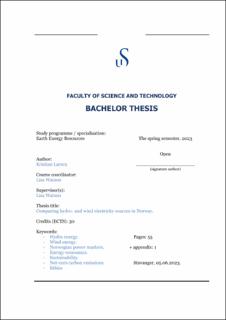| dc.contributor.advisor | Lisa Watson | |
| dc.contributor.author | Kristian Larsen | |
| dc.date.accessioned | 2023-08-30T15:51:23Z | |
| dc.date.available | 2023-08-30T15:51:23Z | |
| dc.date.issued | 2023 | |
| dc.identifier | no.uis:inspera:135971507:56425192 | |
| dc.identifier.uri | https://hdl.handle.net/11250/3086422 | |
| dc.description.abstract | The motivation for this study was to get a better understanding of the two main power production methods, as more and more wind power plants are appearing in Norway, alongside a rise in the export of electricity overseas.
This thesis examines the key aspects of hydro- and wind energy, focusing on their environmental impact, technological considerations, overall efficiency, economics, ethics, and implications for the common good. By evaluating these factors, this research aims to provide a comprehensive understanding of the advantages, challenges, and trade-offs associated with both energy sources.
The conclusion of this study highlights that both hydro- and wind energy are proven to be environmentally friendly and economically viable. Wind power plays a crucial role in Norway's efforts to achieve a net-zero carbon emission target, considering the growing electricity demand to meet climate goals. The government's strict regulation and careful consideration of ethical, economic, and common good factors are emphasized.
The findings of this study contribute to the broader discussion on sustainable energy development and inform decision-making processes towards a more efficient, ethical, and environmentally responsible energy mix in Norway. | |
| dc.description.abstract | The motivation for this study was to get a better understanding of the two main power production methods, as more and more wind power plants are appearing in Norway, alongside a rise in the export of electricity overseas.
This thesis examines the key aspects of hydro- and wind energy, focusing on their environmental impact, technological considerations, overall efficiency, economics, ethics, and implications for the common good. By evaluating these factors, this research aims to provide a comprehensive understanding of the advantages, challenges, and trade-offs associated with both energy sources.
The conclusion of this study highlights that both hydro- and wind energy are proven to be environmentally friendly and economically viable. Wind power plays a crucial role in Norway's efforts to achieve a net-zero carbon emission target, considering the growing electricity demand to meet climate goals. The government's strict regulation and careful consideration of ethical, economic, and common good factors are emphasized.
The findings of this study contribute to the broader discussion on sustainable energy development and inform decision-making processes towards a more efficient, ethical, and environmentally responsible energy mix in Norway. | |
| dc.language | eng | |
| dc.publisher | uis | |
| dc.title | Comparing hydro- and wind electricity sources in Norway. | |
| dc.type | Bachelor thesis | |
